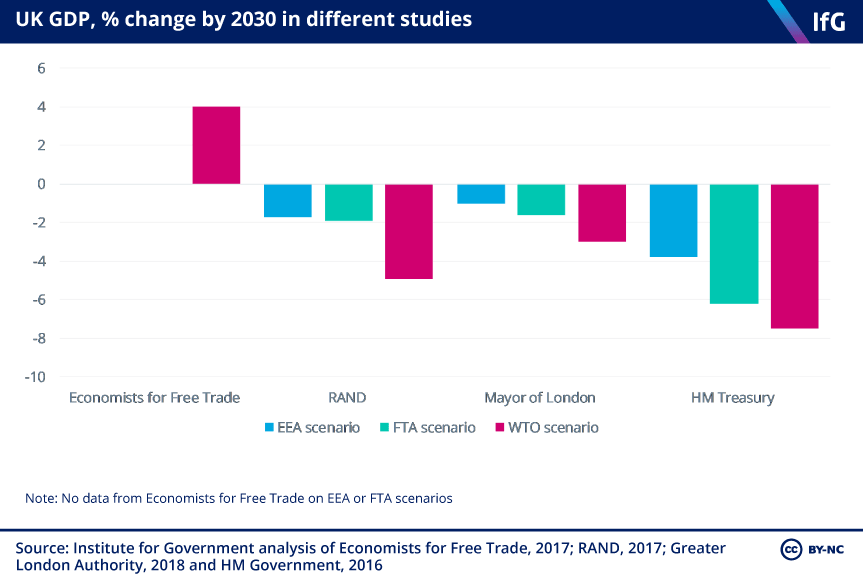What does the Government think about the economics of Brexit?
The government should publish its economic assessments of Brexit to ensure that the Cabinet, Parliament and the public can make an informed decision.
The Government has yet to set out its own analysis of the economic impact of Brexit, though many others have. A serious public debate about the kind of Brexit we want is needed, and the Government must lead this, argues Tim Durrant.
Since the EU referendum, various universities, think tanks and others have published studies of the potential impact of different Brexit outcomes on the UK economy.
Yesterday, the Scottish Government published its assessment of the possible impacts of different future relationships between the UK and EU on Scotland’s economy.
Last week, the Mayor of London, Sadiq Khan, published an 80-page paper looking at the effect of a range of future trading relationships on the UK and London economies.
RAND Europe has made its own contribution, which also considered US interests in the UK-EU deal.
The UK Trade Policy Observatory at the University of Sussex has considered various aspects of the UK-EU trading relationship, including its impact on the cost of living for UK households.
And Economists for Free Trade has published a study looking at the benefits of a looser UK-EU relationship.
Reports on the economic impact of Brexit have a wide variety of conclusions…
It is not surprising that the outcomes of these Brexit studies vary. As any economist will tell you, forecasting is notoriously tricky. These studies are based on economic models which, though complex, will never be able to fully represent the various building blocks and interactions of a modern economy.
What’s more, the results of any economic model are dependent on the assumptions that the modellers use. So, it is not surprising that the outcomes of these studies vary.
....but there are some common themes
At a recent Institute for Government event, Charles P. Ries of RAND and Professor Alan Winters of the UK Trade Policy Observatory both presented a firm conclusion: the more barriers to trade between the UK and the EU that are put up, the more damaging it will be for UK economic growth.
They found that a move to trading with the EU on World Trade Organization (WTO) rules, the most basic trading arrangement possible, would have the most significant negative impact.
While the exact figures differ, this finding is replicated across most of the economic studies of Brexit.

There are some, albeit a minority, who disagree. The third speaker at our event, Liam Halligan of the Daily Telegraph, said that a move to WTO rules would not be problematic for the UK.
Economists for Free Trade go further, saying that moving to WTO rules would lead to a significant boost in UK economic growth compared to staying in the EU.
The Government’s voice is missing from this debate
While academics, media commentators and devolved and regional authorities have made their views on the economic impact of Brexit well known, the UK Government has yet to set out its assessment of the economic impact of the various options for the UK’s future relationship with the EU.
Of course, the Treasury did publish forecasts before the EU referendum, but since the short-term recession it predicted failed to materialise, a number of commentators have questioned the department's long-term assessments too.
There was a flurry of excitement last year when the Department for Exiting the EU was forced by Parliament to release its ‘impact assessments’, until Brexit Secretary David Davis conceded that no such assessments existed.
The Chancellor, Philip Hammond, confirmed in December that the Treasury has analysed a range of possible UK-EU relationships after Brexit. But this work is yet to be made public, with some reports that it has not even been shared with other Cabinet ministers.
The Government should set out its analysis of the economic impact of Brexit
We are nearly halfway through the two-year Article 50 negotiating period and we are told that Cabinet is only just beginning a conversation about the kind relationship it wants with the EU in the future.
There are other factors to consider beyond economics, but it is essential that the Government considers the economic implications of the possible relationship it could negotiate with the EU.
The public debate on the future relationship between the UK and the EU is only just beginning. The Government has an opportunity to lead the conversation for the country and show that it is making decisions in the national interest. But to do that, it needs to be transparent and publish its own economic assessments to ensure that the Cabinet, Parliament and the public can make an informed decision.
Watch or listen to our event on the economics of Brexit.
- Topic
- Brexit
- Administration
- May government
- Publisher
- Institute for Government